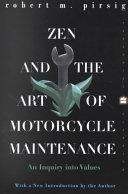Source: Zen and the Art of Motorcycle Maintenance (1974), Ch. 29
Context: The Immortal Principle was first called water by Thales. Anaximenes called it air. The Pythagoreans called it number and were thus the first to see the Immortal Principle as something nonmaterial. Heraclitus called the Immortal Principle fire and introduced change as part of the Principle. He said the world exists as a conflict and tension of opposites. He said there is a One and there is a Many and the One is the universal law which is immanent in all things. Anaxagoras was the first to identify the One as nous, meaning "mind."
Parmenides made it clear for the first time that the Immortal Principle, the One, Truth, God, is separate from appearance and from opinion, and the importance of this separation and its effect upon subsequent history cannot be overstated. It's here that the classic mind, for the first time, took leave of its romantic origins and said, "The Good and the True are not necessarily the same," and goes its separate way. Anaxagoras and Parmenides had a listener named Socrates who carried their ideas into full fruition.
Quotes from book
Zen and the Art of Motorcycle Maintenance

Zen and the Art of Motorcycle Maintenance: An Inquiry into Values , by Robert M. Pirsig, is a book that was first published in 1974. It is a work of fictionalized autobiography, and is the first of Pirsig's texts in which he explores his Metaphysics of Quality.
Source: Zen and the Art of Motorcycle Maintenance (1974), Ch. 29
Context: It's paradoxical that where people are the most closely crowded, in the big coastal cities in the East and West, the loneliness is the greatest. Back where people were so spread out in western Oregon and Idaho and Montana and the Dakotas you'd think the loneliness would have been greater, but we didn't see it so much.
The explanation, I suppose, is that the physical distance between people has nothing to do with loneliness. It's psychic distance, and in Montana and Idaho the physical distances are big but the psychic distances between people are small, and here it's reversed.
Source: Zen and the Art of Motorcycle Maintenance (1974), Ch. 29
Context: Lightning hits!
Quality! Virtue! Dharma! That is what the Sophists were teaching! Not ethical relativism. Not pristine "virtue." But aretê. Excellence. Dharma! Before the Church of Reason. Before substance. Before form. Before mind and matter. Before dialectic itself. Quality had been absolute. Those first teachers of the Western world were teaching Quality, and the medium they had chosen was that of rhetoric.
Source: Zen and the Art of Motorcycle Maintenance (1974), Ch. 28
Context: Religion isn't invented by man. Men are invented by religion. Men invent responses to Quality, and among these responses is an understanding of what they themselves are. You know something and then the Quality stimulus hits and then you try to define the Quality stimulus, but to define it all you've got to work with is what you know. So your definition is made up of what you know. It's an analogue to what you already know. It has to be. It can't be anything else. And the mythos grows this way. By analogies to what is known before. The mythos is a building of analogues upon analogues upon analogues. These fill the collective consciousness of all communicating mankind. Every last bit of it. The Quality is the track that directs the train. What is outside the train, to either side—that is the terra incognita of the insane. He knew that to understand Quality he would have to leave the mythos. That's why he felt that slippage. He knew something was about to happen.
“Zen is the "spirit of the valley."”
The only Zen you find on the tops of mountains is the Zen you bring up there.
Source: Zen and the Art of Motorcycle Maintenance (1974), Ch. 20